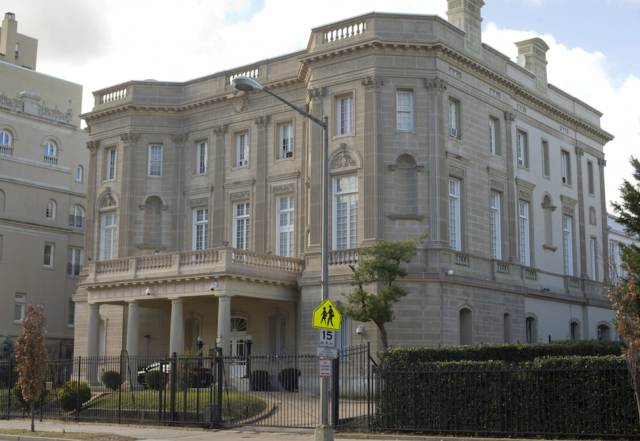The U.S. and Cuba announced Tuesday they would re-open embassies in Havana and Washington, D.C., as part of the “most important changes to Cuba policy in more than 50 years,” senior Obama administration officials said.
JUMP TO:
Experts weigh in on improved US-Cuba relations
Alan Gross shows gratitude, humor in first appearance after release
The two countries have also agreed to opening economic and travel ties, marking a historic shift in U.S. policy toward the communist island after a half-century of enmity dating back to the Cold War, American officials said Wednesday.
The announcement came amid a series of sudden confidence-building measures between the longtime foes, including the release of American prisoner Alan Gross, as well as a swap for a U.S. intelligence asset held in Cuba and the freeing of three Cubans jailed in the U.S. Gross arrived at Andrews Air Force Base outside Washington.
What started with the prisoner swap may end up being the biggest change in Cuban-U-S relations in half a century. Around the time of a famous handshake between the U.S. and Cuban presidents at Nelson Mandela’s funeral in December of 2013, high level contacts were established including negotiations in Canada and at the Vatican and a final phone call between the two presidents that sealed the deal on Tuesday.
CCTV America’s Nathan King reported from Washington.

These are some of the actions U-S President Barack Obama can take without lifting the full embargo against Cuba — which would require an act of Congress:
• Reestablish diplomatic relations – Ambassador for first time since 1961
• Many travel restrictions lifted
• Cubans allowed to send more money from U.S.
• American businesses and banks allowed to invest in Cuba
• U.S. credit and debit cards can be used in Cuba
• U.S. to review Cuba’s designation as a state sponsor of terrorism
The decades-old trade embargo was initiated by U.S President John F. Kennedy shortly after Fidel Castro took power in Cuba in 1962, following the 1959 Cuban revolution. The embargo was an effort to bring democracy to the island. Other U.S presidents followed, extending the embargo to foreign countries that traded with Cuba.
CCTV America’s Jessica Stone reported from Washington.

But in 2009, breaking with a half-century of U.S policy, President Barack Obama lifted restrictions on Cuban-Americans who wanted to travel and send money to their Cuban homeland. With growing calls among a new generation of Cuban-Americans to lift the embargo, many in the U.S believe the time is now.
“The embargo has been counterproductive in bringing democracy to the island,” Juan Carlos Hidalgo from CATO Institute said.
The Cuban government estimates that it has lost more than a trillion dollars because of the embargo. Major U.S agricultural producers say they are losing out as well. It’s a point hit home in 2001 when the U.S began exporting food to Cuba.
Key events in U.S.-Cuba relations
Story compiled with information from CCTV-America and The Associated Press.
Cubans react positively to restoration of U.S. relations
In Havana, Cubans gathered around television sets in anticipation of the announcement on U.S.-Cuba relations by President Raul Castro. The reaction among Cubans was overall a positive one. Many were delighted that relations with their long-term enemy across the Straits of Florida was finally changing. This comes after Cuba had long blamed the U.S. for both its economic problems and the need to maintain a one-party state. Now, Cubans are waiting to see what further changes this historic initiative might bring.
CCTV America’s Michael Voss reported this story from Havana.
Follow Michael Voss on Twitter @mvosscuba

Improved US-Cuba relations to impact Latin America
The U.S.-Cuba announcement is expected to have wide repercussions across Latin America. CCTV America’s Stephen Gibbs reported this story from Rio de Janeiro.
Latin American leaders have tended to see U.S. treatment of Cuba as that of a bully. U.S. policy toward Cuba has often been a rallying call for the region’s leftist governments, bringing together nations such as Venezuela, Nicaragua, Bolivia, and Ecuador on a broadly anti-American path.
It is therefore significant that the breakthrough in relations between longtime foes, Cuba and the U.S. was brokered by Argentine Pope Francis.
Any weakening of the U.S. embargo, which seems increasingly likely now, will have also have its winners and loser in this region.
Brazil could be one winner as it has invested heavily in a major new port in Cuba which will benefit from increased trade.
In contrast, one possible loser is Panama, which has long been an entry point for goods to the island.
Venezuela, currently in the midst of an economic crisis, may also be concerned that its closest ally is looking North now.
We are all Americans, said President Obama at the end of his speech, addressing as he put it, our “family to the South”.
CCTV America’s Stephen Gibbs reported from Rio de Janeiro.

 CGTN America
CGTN America The Cuban Interests Section building in Washington, D.C., the de facto diplomatic mission of the Republic of Cuba to the US. (AP Photo/Pablo Martinez Monsivais)
The Cuban Interests Section building in Washington, D.C., the de facto diplomatic mission of the Republic of Cuba to the US. (AP Photo/Pablo Martinez Monsivais)
